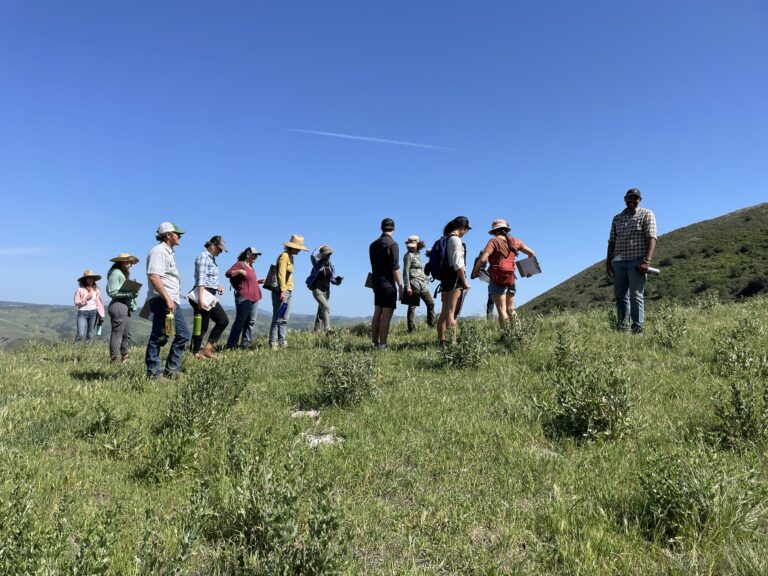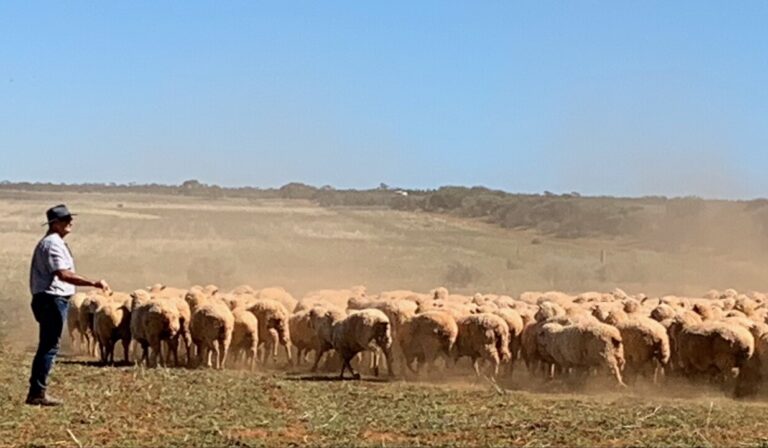Excerpted from an interview at Tribalize IV on May 14, 2021
Questions in bold. Allan Savory’s answers in regular text.
I’d like to set the stage by sharing a quote from Shunryu Suzuki. He says, “In the beginner’s mind there are many possibilities. In the expert’s mind there are few.” What does this mean to you — was he onto something here?
Means a great deal – parallels what I have experienced training thousands of people from university Professors to illiterate villagers, while we were developing the Holistic Management framework. I found that lack of expertise did not block learning or discussion of all manner of possible solutions to issues we tackled. However, I did find that what experts in narrow fields already knew and their egos blocked them from even participating in open discussion on alternative actions – in fact people with higher academic credentials commonly brought training sessions to a complete standstill with extreme anger.
You have written: “As scientists we are first and foremost humans, and like all humans we tend to see what we believe, rather than believe what we see.” Could you speak to the importance of open-minded observation and common sense for all of us — regular folks and scientists?
We are all capable of open-minded observation and its importance cannot be overstressed. However, as I learned myself, when we believe something deeply (for whatever reason) it is easy to see “evidence” that supports our belief, while any evidence not supporting what we believe becomes virtually invisible. I am an example myself with the research I did, that led to the government culling elephants that I talked about in my 2013 TED Talk on desertification. I simply “proved” what all of us believed – that if land is damaged by animals there are too many of them. After culling over 40,000 elephants the situation got worse not better! We were all wrong but most scientists still hold to the same view despite the evidence and now propose culling again! Early people with no “trained” experts developed all present domesticated animals and plants – even produced six vegetables from one weed. Since we have “believed” academic training is superior to farmer observation many persist in the belief despite evidence that we have been losing diversity of our crops and breeding livestock to be dependent on crops, while even losing cultures and languages.
Common sense is a different issue – individual humans have great capacity for what we call common sense. But as soon as we manage at scale which we do through organizations, we find such institutions are almost incapable of common sense. This is so serious in all nations I need to give examples everyone can relate to as individuals but human organizations cannot.
First, ask any person in America “Does it make sense to produce oil to produce corn to produce fuel?” Any normal person sees that as stupid, but many thousands of highly trained professional people in American institutions are doing so with few, if any, questioning such stupidity.
Another less technical example: Take just one of our great religions – Christianity. Christ’s message of love and caring was simple and clear. Many millions of individuals have done that for centuries but what about organizations managing religion? Since that began we have seen well over one thousand six hundred different Christian organizations develop and some of these have fought, killed and tortured people for centuries and protected paedophile priests rather than love and care for innocent children. Not at all what the founder of any religion advocated and completely lacking common sense and humanity. I am sure we will return to this issue of how organizations behave unlike any normal healthy human behaves.
Could you please explain complex vs. complicated?
I use the Systems Science definition because people generally confuse the two and treat them as interchangeable. Civilization runs on agriculture from the food we produce to art, music, all the trappings of civilization we make to space craft and computers. Everything we produce or make has these points in common. Nothing we produce can self-organize and so it ends if we stop producing, stops if fuel runs out, battery dies, part is missing or breaks. Things we make or produce can be produced on their own independent of other things we produce. Everything we produce does what we intend it to do and no more — food feeds us, music entertains, computers compute. What we produce is generally complicated – even making a pencil is too complicated for most people today so companies produce them and not individuals. Everything we produce including our food we do not manage, we produce.
Now if we look at all the things that we manage we see an entirely different situation. Everything we manage is self-organizing. Nothing we manage stops if a part is missing or fuel runs out, if people die or thousands of species die, or even if an entire economy collapses. We also find everything that we manage cannot be managed in isolation from the other things that we manage – they need to be managed like one indivisible entity. And everything that we manage has what are called emergent properties – meaning it does things we intend, but also things we did not intend that can have serious unintended consequences. Everything we manage in Systems Science is defined as complex – self-organizing with emergent properties leading frequently to unintended consequences.
This poses the question, what is it that we manage? We manage only three things and in doing so produce everything making civilization possible. The three things we manage are humans (mainly at scale through organizations/institutions) and through those we manage nature (environment) and we manage economies. These we do not make or produce we manage. So just looking at agriculture alone as the foundation of city-based civilization – we produce food and fibre from the world’s land and waters. Beef, fish, grain, timber, milk, wool, leather, etc. at large scale by human organizations managing nature (plants and animals) in the prevailing economy. And the only economy that can sustain any civilization has to be based on nature we are managing mainly through agriculture in its broadest sense (photosynthesis).
So I guess the quick definition of complicated and complex – is that the former is everything humans produce and the latter is everything humans manage.
Addressing symptoms and not the cause of a problem is unfortunately common practice not only in modern medicine, but in politics, environmental policies, our economy, and even in our personal relationships. Why have so many of us fallen into this way of navigating life?
While it is common sense that to solve any problem we must address the cause of the problem, I believe we have fallen into this pit of consistently addressing symptoms because we manage at large scale through institutions. Individuals still exhibit great common sense daily but individuals do not develop the policies that govern management at scale. Governments, political parties, large environmental organizations, corporations and international agencies dictate manage at large scale – all incapable of common sense and thus we keep repeatedly addressing symptoms.
Many human beings are certain that desertification and climate change are caused by livestock, coal and oil. Why is this actually a misguided notion?
I think we could say almost all humans including Nobel Laureates are certain in this belief. In the case of livestock it has been the belief for about 10,000 years. I and millions of others were taught livestock cause desertification at university. When you ask why this is a misguided notion I believe it is because we fail to see the evidence that does not fit our beliefs. Just as I failed to see it for decades.
With almost all scientists now over denial and acknowledging that humans are causing desertification and climate change, that has only one possible interpretation. If we are causing it then it can only be management that is the cause. Why? Because if we use common sense as individuals we immediately recognize that coal, oil and livestock are resources from which we produce fuel and electricity, food and fibre. And it is not the resources but how we manage such natural resources that leads to environmental damage. No resource can cause damage, only through how we manage our resources (nature) and our economy can we cause damage and especially at the scale of global desertification and climate change.
Today global finance and the agricultural policies of governments are driving environmental destruction even more than fossil fuels we blame.
If management is the cause of desertification and climate change and there are thousands of ways in which organizations – political parties, governments, democracies, dictatorships and international institutions develop policies is that not going to make it extremely difficult to solve the problem and save humanity?
Fortunately not. While we believe there are many ways of managing which is true, we discovered that if we peeled the onion as it were in all the different ways the core — where the actual decisions are made — is always identical. This we discovered in about 1984 and first published in 1988. Our human decision-making is what we call reductionist because when producing everything that we do while managing humans, nature and economies, we reduce that mind-blowing complexity to the reason and context for all conscious decisions being to meet our needs and desires or to address problems.
Making decisions in this manner we see amazing success leading us to believe there is no limit to human ingenuity and technology. We can feed the world, put a man on the moon, engineer genes, geo-engineer nature and dream of going to Mars with no limit to our ingenuity and technology. However in doing all these wonderful things, we are having to manage humans, nature and economies which are complex and thus we experience unintended consequences such as global desertification, mega-fires and climate change along with their many symptoms – increasing droughts and floods, poverty, social breakdown, mass emigration to cities and across borders, violence, recruitment to dissident organizations and war. So common are unintended consequences of management that economists jokingly refer to “The Law” of Unintended Consequences!
Fortunately, our inability to manage social, cultural, environmental and economic complexity is relatively easy to begin to correct, as we discovered in developing the Holistic Management framework. We begin correcting it in any management situation (family to nation and beyond) by still making decisions to produce all we do to meet our needs, desires or address problems, but now doing so in what we call a holistic context. A holistic context that ties our lives and behaviour to our life-supporting environment – a simple management concept not in any branch of philosophy, religion or science. A holistic context that ensures our actions are simultaneously socially, culturally, environmentally and economically sound both short and long term.
Is it possible to train ourselves to think and act holistically rather than in a reductionist manner? How?
Absolutely very easy to learn how to manage holistically from individual level, family to government and large institutions developing policy that determines management as in agriculture or energy. My daughter is teaching Holistic Management decision-making and very basic ecological literacy in schools in Zimbabwe and finds seven-year-old kids get it quickly and are now teaching their parents. When you ask How? I can only say it is so practical that the best way is simply doing it with a coach who understands the process of decision-making in a holistic context. It is just like riding a bicycle. If you have never seen a bicycle the more I try to describe it and how to ride it the more confused you become. If we have a bicycle and I show you then you learn in a day.
Let’s say that I am farming and I decide to stop ploughing and practice “No Till” cropping because it keeps more carbon in the ground. If I understand correctly, this would be changing a practice but not changing the underlying management – how my actions are decided and in what context. Can you speak more about this?
Yes, you have got it. That is as you say changing from ploughing damaging soil to not ploughing and planting a different way. That is likely to be far better for soil life, water retention, crop yield, and ultimately the economy, and society. Thousands of farmers are doing so which is great. However, it will not address desertification or climate change. The reason is that farmers doing so are not addressing the cause of climate change, which is management of institutions, nature and economy at government policy level.
The increasing numbers of farmers basing better practices on the biological or life sciences are going in the right direction (holistic policy analysis shows) but what they advocate is opposed by far greater institutional influences – over $300 million in annual lobbying in Washington DC in support of cropping practices based on chemistry and marketing of oil and technology by corporations managed by ecologically illiterate CEOs and boards. Farmers striving to develop truly regenerative agriculture, which can only happen when management is holistic addressing climate change, are also opposed by billionaires and celebrities investing fame and fortune in vilification of livestock and manufacturing meat in support of a vast urban population of vegans totally detached from nature. And the farmers trying to do the right thing are operating in an economic environment dominated by global finance driving environmental destruction. Remember we manage three things causing climate change – institutions, nature and economy and it is management that is the single cause of climate change.
Allan, some people tuning in are hearing all of this for the first time and may be wondering what Holistic Management looks like in the real world. Do you have any stories that could illustrate the results of managing holistically?
We have a great many examples but all farm families and so on – many have been dominating awards in good stewardship, awards have been won, and many publications documenting results. Many cases are documented in countless research and other materials available at this site www.savory.global including their Science Library.
Can you provide simple concrete examples of Holistic Management where people made decisions to meet their needs, desires or deal with problems but in a holistic context?
Yes, let me give two simple cases.
First, a couple who came for training by me. A month later I heard from my staff that the couple had left the farm. I was so sad that we had not caught them in time to save them from bankruptcy as we had with many farmers. The staff then laughed as they were teasing me. They explained that the couple developed their own holistic context thinking deeply about the lives they wanted. Doing this they realized they did not want to be farming. They were farming because his family expected them to take over the family farm. Their first management action was to call a family meeting, lay it out and make a family decision, which was to sell the farm and all get on with lives of their choosing. That to me was an immediate result probably preventing years of unhappiness and perhaps divorce. That is Holistic Management and as you see nothing to do with any damn grazing system as ill-informed academic critics imply.
My own case. I live on a ranch in Zimbabwe close to the famous Vic Falls amongst Africa’s big game in the wild – but over 4,000 farms and ranches have been taken by the government and given to politicians, judges, soldiers and supporters of the government – and yet my wife and I am still there on the land living the lives we desire. How? Only through managing holistically. Years ago my wife and I developed our holistic context. As usual 100% how we want our lives to be, 0% how to do it as no action can be in the context for all actions. When I looked at the reality of Zimbabwe after years of civil war, I could see that what mattered was living on the land, working with poor people and enjoying the wildlife around us. Ownership was not confused with management. It was the result of a past action to buy the ranch. Looked at in our holistic context it was an impediment. It was clear that by holding onto ownership as a white person with black racist government, I would lose everything, but by giving it away we could preserve all that was important to us. So by agreement with the President who I knew, I gave the land to the people through a trust with the Chiefs as trustees with my wife and I. Friends said I was insane to just give away millions of dollar’s worth of land – but today they ask how I could see so far ahead so clearly. I could not but I could make management decisions holistically in context with all that was important in my life.
What does a world that is managed holistically look like?
Imagine that for yourself. Almost every problem humans face is caused by humans or exacerbated by humans. There is no one out there in space causing all the strife, war, mass emigration, environmental refugees changing the political face of Europe and the US, causing desertification, mega-fires and climate change – we are doing it. And we are doing it entirely though management that is always reductionist – that is the single cause. By reductionist as I explained, I mean that we reduce the complexity of culture/society, organizations, nature and economy to the reason and context for our actions consistently being to meet our needs, desires or address problems. Not only is this the cause of almost all that ails us today, but it was the cause of the failure of more than twenty civilizations in all regions of the world in the past. So now what do you or anyone think the world might be like if we began addressing that cause?
If we do not then the future is predictable – one of increasing environmental human habitat destruction with the inevitable collapse of city-based civilization even if we plant trillions of trees and a few billionaires make fake meat and go to Mars!
If individual people and farmers manage holistically their lives will be better but all the good will be swamped by the tsunami of global desertification and climate change.
If somehow we can get one or two political leaders with the power to do so to carry on with agricultural and energy policies as they are and take no political risk, but concurrently allow us to show them how to ride the bicycle (develop agriculture and or energy policy in a national holistic context) then change could well follow fast and give coming generations a fighting chance.





